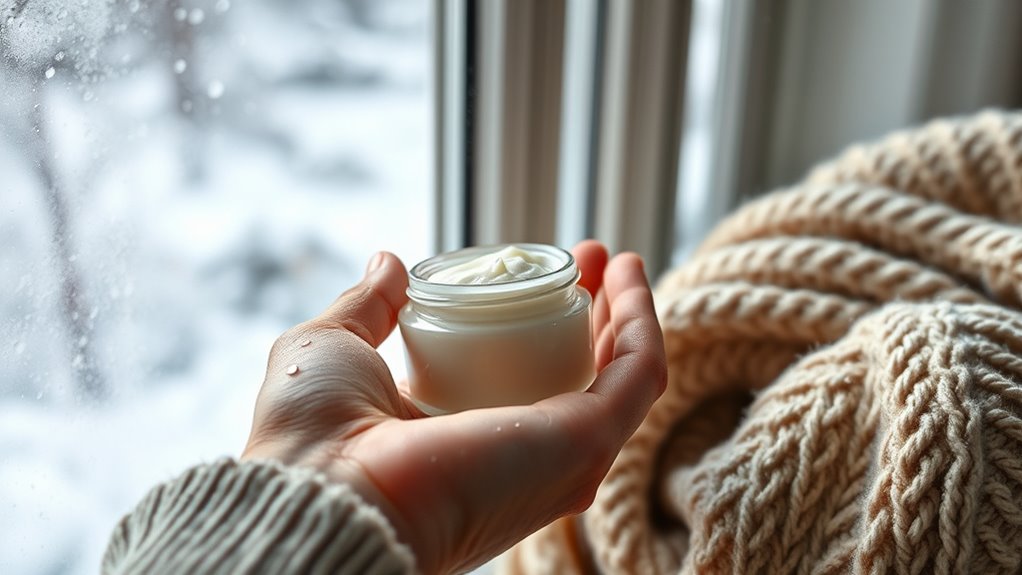When cold weather hits, it’s crucial to adjust your skincare routine. Use oil-based moisturizers and gentle, fragrance-free cleansers to keep your skin hydrated. Limit hot showers and keep them short to preserve natural oils. Protect your skin outdoors with gloves and scarves, and don’t forget to apply SPF lip balm. Inside, consider using a humidifier to combat dry air. With these strategies, your skin can stay healthy and comfortable through winter—discover more tips to enhance your routine.
Key Takeaways
- Use oil-based moisturizers to lock in moisture and combat dry skin effectively during cold weather.
- Limit hot showers; opt for warm water to preserve your skin’s natural oils.
- Incorporate a humidifier in your home to combat indoor dryness caused by heating.
- Cover exposed skin with gloves and scarves to protect against windburn and cold damage.
- Stay hydrated and consume omega-3-rich foods to support your skin’s health in winter.

As winter arrives, you might notice your skin feeling drier and more sensitive due to the cold air and low humidity. The dry air can sap your skin’s moisture, leading to irritation and discomfort. If you have conditions like eczema or psoriasis, you may find them flaring up more often during these chilly months.
As winter sets in, your skin may feel drier and more sensitive, making hydration essential for comfort and health.
The cold weather, combined with exposure to biting winds, can also cause windburn, especially on your face, making it essential to take steps to protect your skin. To combat winter dryness, it’s crucial to switch up your skincare routine. Start by using oil-based or denser moisturizers that lock in moisture more effectively than lighter lotions. Gentle, fragrance-free soaps and cleansers are your best bet to avoid further irritation.
After showering or washing your hands, apply moisturizer immediately while your skin is still damp. This helps seal in hydration. Remember, hot showers may feel great, but they can strip your skin of its natural oils, so opt for warm water instead. Moisture loss from skin can be exacerbated by long, hot showers, so keeping your bathing routine short and warm is beneficial. In colder months, regular skin treatments can also help maintain your skin’s hydration levels and overall health.
Indoor heating can also contribute to dry skin, so consider running a humidifier to add moisture to the air. If you don’t have one, a cool-mist vaporizer is a great alternative. Be mindful of raising indoor temperatures too high, as that can worsen dryness.
Opt for soft, breathable fabrics like cotton in your clothing and bedding to minimize irritation on your skin. When heading outdoors, don’t forget to protect your exposed skin. Wear gloves and scarves to shield your skin from harsh winds. Applying lip balm with SPF helps protect your lips from cold weather and UV rays, even on cloudy days.
It’s vital to cover up as much of your skin as possible to prevent windburn and cold damage. Hydration is just as important for your skin during winter. Increase your water intake to maintain hydration from the inside out. Eating foods rich in omega-3 fatty acids can also support skin health. Aim for a balanced diet that enhances your skin’s natural barrier function, and don’t forget to drink at least eight glasses of water a day.
Finally, avoid harsh scrubs and products with drying ingredients like alcohol. Instead, use gentle exfoliating cloths and limit your shower frequency to keep your skin’s moisture intact. Adjusting your skincare products to meet the challenges of winter can make a world of difference in keeping your skin healthy and hydrated.
Frequently Asked Questions
How Often Should I Apply Moisturizer in Winter?
You should apply moisturizer twice daily in winter to keep your skin hydrated and prevent dryness.
Consistency is key, so don’t skip it, or you might end up with flaky skin.
If your skin is oily, you may not need to moisturize as often, but dry skin benefits from regular hydration.
Remember to adjust your routine based on your skin type and the environment to maintain a healthy, glowing complexion.
Can Diet Affect My Skin’s Winter Health?
You mightn’t realize it, but what you eat can significantly affect your skin’s health in winter. Consuming nutrient-dense foods, like avocados and sweet potatoes, helps keep your skin hydrated and glowing.
Hydrating foods and healthy fats support your skin’s barrier, while antioxidants fight off oxidative stress. By focusing on a balanced diet, you can enhance your skin’s resilience against winter woes and maintain a healthy complexion all season long.
Is Sunscreen Necessary During Winter Months?
Yes, sunscreen’s necessary during winter months.
UV rays still impact your skin, and snow can reflect up to 90% of these harmful rays, increasing your exposure.
Even on cloudy days, up to 80% of UV radiation can penetrate the clouds.
Applying a broad-spectrum sunscreen with at least SPF 30 protects against skin damage, premature aging, and skin cancer.
Don’t forget to reapply every two hours, especially if you’re outside for extended periods.
What Ingredients Should I Avoid in Winter Products?
Choosing winter products is like picking the right coat for chilly weather; you want something that protects you.
Avoid fragrances and alcohol-based products, as they can irritate and dry out your skin. Steer clear of salicylic acid and benzoyl peroxide, which can worsen dryness.
Also, watch out for harsh preservatives and irritating surfactants, like SLS. Instead, opt for gentle, hydrating ingredients that nurture and soothe your skin throughout the colder months.
How Do Indoor Heating Systems Impact My Skin?
Indoor heating systems can really impact your skin. They lower humidity, which dries out the air and strips your skin of its natural moisture.
You might notice increased dryness, irritation, and even redness as your skin becomes more sensitive. This can lead to rough patches and premature aging.
To combat these effects, you should consider using a humidifier and applying rich moisturizers regularly to keep your skin hydrated and healthy.
Conclusion
To keep your skin healthy this winter, remember to hydrate, moisturize, and protect. Don’t let the cold weather rob you of your skin’s natural glow. With a little extra care, you can face the chill with confidence. So, why let winter wreak havoc on your skin when you can take simple steps to shield it? Embrace these tips, and you’ll not only survive the season but thrive through it with radiance and comfort.









